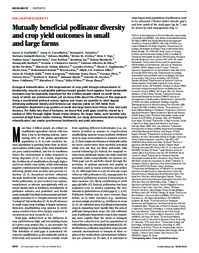Embrapa Agrossilvipastoril
Mutually beneficial pollinator diversity and crop yield outcomes in small and large farms.
Mutually beneficial pollinator diversity and crop yield outcomes in small and large farms.
Autoria: GARIBALDI, L. A.; CARVALHEIRO, L. G.; VAISSIÈRE, B. E.; GEMMILL-HERREN, B.; HIPÓLITO, J.; FREITAS, B. M.; NGO, H. T.; AZZU, N.; SÁEZ, A.; ASTROM, J.; AN, J.; BLOCHTEIN, B.; BUCHORI, D.; CHAMORRO GARCÍA, F. J.; SILVA, F. O. da; DEVKOTA, K.; RIBEIRO, M. de F.; FREITAS, L.; GAGLIANONE, M. C.; GOSS, M.; IRSHAD, M.; KASINA, M.; PACHECO FILHO, A. J. S.; KIILL, L. H. P.; KWAPONG, P.; NATES PARRA, G.; PIRES, C. S. S.; PIRES, V.; RAWAL, R. S.; RIZALI, A.; SARAIVA, A. M.; VELDTMAN, R.; VIANA, B. F.; WITTER, S.; ZHAN, H.
Resumo: Ecological intensification, or the improvement of crop yield through enhancement of biodiversity, may be a sustainable pathway toward greater food supplies. Such sustainable increases may be especially important for the 2 billion people reliant on small farms, many of which are undernourished, yet we know little about the efficacy of this approach. Using a coordinated protocol across regions and crops, we quantify to what degree enhancing pollinator density and richness can improve yields on 344 fields from 33 pollinator-dependent crop systems in small and large farms from Africa, Asia, and Latin America. For fields less than 2 hectares, we found that yield gaps could be closed by a median of 24% through higher flower-visitor density. For larger fields, such benefits only occurred at high flower-visitor richness. Worldwide, our study demonstrates that ecological intensification can create synchronous biodiversity and yield outcomes.
Ano de publicação: 2016
Tipo de publicação: Artigo de periódico
Unidade: Embrapa Semiárido
Palavras-chave: Biodiversidade, Grande fazenda, Pequena fazenda, Polinização, Pollinator diversity, Visitantes florais
Conteúdo relacionado
Embrapa Agrossilvipastoril
Rodovia dos Pioneiros MT-222, Km 2,5, Zona Rural Caixa Postal: 343 CEP: 78550-970 - Sinop - MT
Fone: (66) 3211-4220 - Fax: (66) 3211-4221

